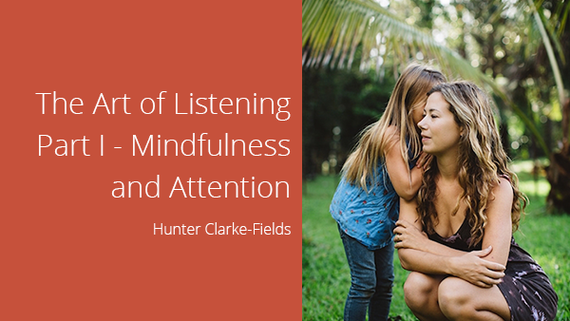As we were preparing for our long car-ride to Rhode Island, my 9-year old daughter Maggie was telling me all the things she's done to get ready (while her sister jumps up and down on the steps).
It's great stuff she's saying, but am I really listening?
No.
Instead my attention is drawn to the little bits of paper on the rug, the open drawer, and the scissors on the floor.
Maybe I catch twenty percent of what she is saying.
I'm not connected with her message or how she's feeling. Instead, I'm caught up in my ever-growing to-do list. It's a communication breakdown on my end.
If this were something important to her, I'd be hurting her feelings and weakening our relationship.
Listening builds relationships
Relationships are built on connection through communication. Fundamentally, we all want to be seen and heard - especially in our closest relationships.
Unfortunately, it's often in our closest relationships -- with our children -- that we withdraw our attention.
That might be because your child has been singing "Bingo" for the last twenty minutes or wants to tell you all about Twilight Sparkle's story on My Little Pony. For some crazy reason, we tend to tune that out.
Or it might be because you are in "doing" mode - getting things done, or on your way out the door. So you only listen with a tiny fraction of your attention.
But it's important to remember that every time your child talks to you, they are wanting to make a connection. Every time they want to connect, it can be a bell of mindfulness - a reminder to pause and listen with all of your attention.
Listening as a helping skill
Listening is a powerful helping skill. When we practice listening mindfully - with our focused, non-judgemental attention - then can we truly understand what is going on for our children.
When we listen, our children feel seen and heard. Sometimes, that's all it takes to solve their problem. They feel understood.
Listening helps our children in the same way it helps us - children can speak their problem out loud to an attentive ear and gain clarity. Oftentimes, if we listen to a problem all the way through, kids talk themselves into a solution.
We must be present
In order to listen for be healing, we must make an intentional effort to be fully present. This is the practice of mindfulness - non-judgmentally focusing our attention on what is happening in the present moment.
Listening mindfully is no easy thing to do. Our minds wander. Emotions and judgements come up. We feel the urge to interrupt. We want to solve their problem for them rather than hear them out.
Think of listening as its own kind of mindfulness practice. First, could take a few deep breaths. Consciously set an intention to be attentive. Then, put your attention on what your child is saying - and your own internal dialogue.
Here are some things to be aware of when practicing mindful listening:
- Do you feel the urge to share your own story?
- Do you feel the urge to offer advice?
- What emotions are you experiencing?
- Are you trying to get them to feel something different?
- Are you making any assumptions?
Awareness is the first step
When I first started to practice mindfulness of my conversations, I was shocked by my wayward brain. My mind constantly wandered, judged, assumed and wanted to interrupt.
Are our minds always like this? Probably. But don't fret, awareness is the first step.
Once we are aware of how distracted we are, then can we choose to make a change. Our minds come up tens of thousands of thoughts a day. It's an onslaught. But as soon as you are aware that your mind has wandered, you are back in the present moment.
Listening is a powerful, healing skill that is available to all of us.
In the second part of The Art of Listening, I will share more of the "how" of listening - how do we respond to promote healing and understanding?
Until then, take five minutes today to practice being fully present while you are listening to your child. Let me know how it goes!
What do you think?
Are you distracted when you're listening to your children? How does that affect your relationship? Start the conversation in the comments below.

